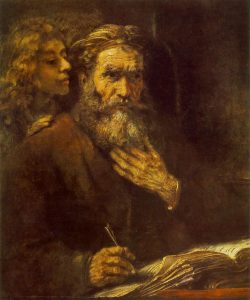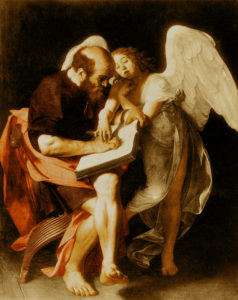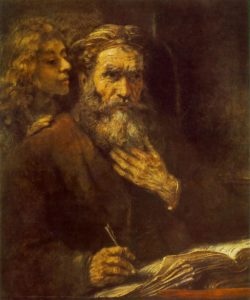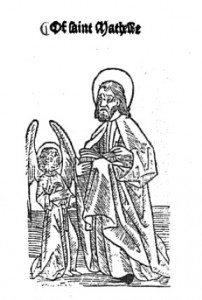Illuminations on the readings for Sept. 24, 2023 (Feast of St. Matthew)
First Reading: Proverbs 3:1-6
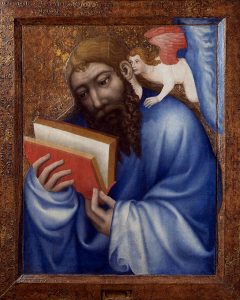
Matthew the Apostle (c.1360), painting by Master Theodoric of Prague (c.1328-c.1381). National Gallery in Prague, Czech Republic. (Click image to enlarge.)
The feast of a church’s patron may be transferred from its usual date to the closest Sunday, so we celebrate the Feast of St. Matthew, which normally falls on September 21, this Sunday in place of the 17th Sunday of Pentecost. The readings chosen for this day reflect the tradition of Matthew as a tax collector elevated to apostle and evangelist. In our first reading, the Book of Proverbs advises us to keep God’s commandments and use them to guide our lives, If we do so, Proverbs assures us, we will be amply rewarded with a good life and good reputation.
Psalm: Psalm 119:33-40
The Psalmist’s message, a brief snippet drawn from the longest of all the psalms, echoes the Proverbs reading: Learn God’s laws and commandments and follow them faithfully. God’s way turns us away from what is worthless, we sing: God’s way gives life.
Second Reading: 2 Timothy 3:14-17
The second letter of Timothy, one of several short pastoral epistles written by later followers in Paul’s name, offers guidance to a growing church. It mirrors the Psalmist’s call for unity in tradition, guided by Scripture. As you read or hear it, though, bear in mind that when it was written in the late first century or early second, the New Testament was not yet assembled into a book, and the Gospels had only recently been written down. “Scripture” meant the Old Testament, summarized in Torah’s command to love God, love our neighbor, and care for the poor and the alien.
Gospel: Matthew 9:9-19
Matthew’s Gospel portrays him as a tax collector, a position that would have made him roundly despised in ancient Israel. The tax collector preyed on his neighbors on behalf of the hated Roman empire. Nevertheless, when Jesus called him, Matthew followed … and then they sat down to dinner in Matthew’s house. Having mercy and calling sinners is Jesus’s way, not self-righteously looking down on those we consider beneath us.

